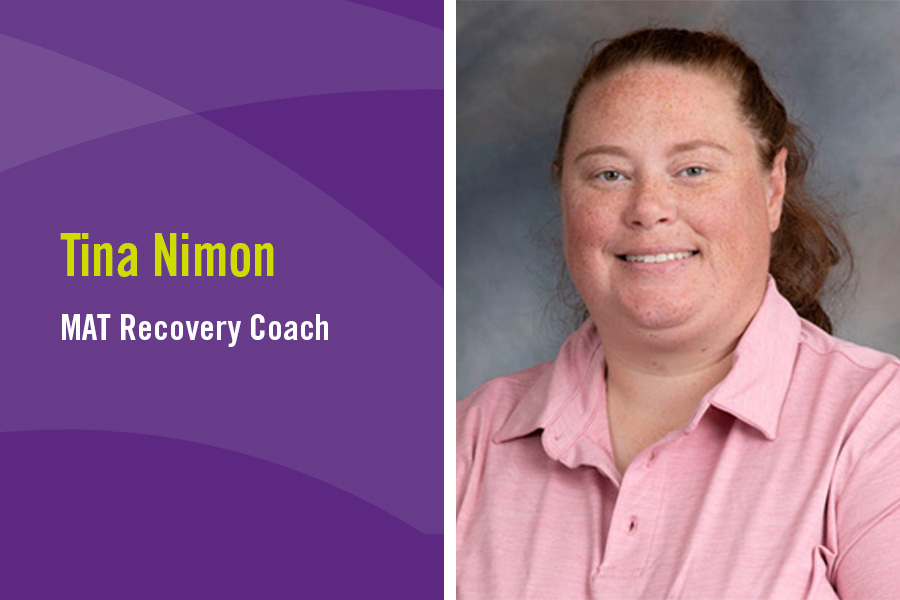10 Ways to Navigate a Sober Holiday Season with Peer Support

The holiday season often brings about feelings of joy, celebration, and togetherness. However, for some, this time of year can also pose unique emotional struggles. OneEighty Recovery Coach, Tina Nimon, shared her own valuable insights on the importance of peer support during the holidays. “I believe in leading by example. If you can’t see it demonstrated, it’s not real,” Tina explained. “I can tell you I’ve been there, but I’m also going to show you it’s real. I’m going to show you that the person that you talk to every week is the same person you’ll see when you come along with me to my home group. You’re going to get the same person. I wouldn’t get to have this job in peer support if I hadn’t also done the work for my own sobriety over the last six years. I share from my own experience, strength, and hope.”
Tina’s journey as a Recovery Coach at OneEighty began over two years ago. Her commitment to peer support and her own personal experiences have shaped her understanding of the challenges clients face, especially during the holiday season. Tina’s evolution within her role—from working in recovery housing to her current position, working alongside OneEighty Medical Director, Dr. Nicole Labor, in Medication-Assisted Treatment (MAT) and detox support—offers a comprehensive view of the diverse needs of those on the path to recovery. Tina’s approach isn’t merely professional—it’s deeply personal. Her commitment to understanding and guiding clients through her own lived experience provides an important reminder of the power of peer support in fostering resilience and strength during challenging times.

Facing Challenges During the Holidays
Loneliness becomes another significant issue for those who lack a strong sober support system. According to Tina, one of the biggest challenges her clients encounter during the holidays revolves around the family dynamic. For many, it’s a painful realization that their family situations aren’t conducive to their recovery. “Either that they can’t be with family because their family is still living a lifestyle that’s not conducive to their recovery, or they don’t have the family relationships because they burnt a lot of bridges,” Tina explained. “And trust, unfortunately, takes time and action.”
Practical Coping Skills and Self-Care
Tina encourages clients to connect with sober support, even when things are going well, to help establish open lines of communication for the inevitability of tougher times. Tina also encourages clients to focus on budgeting and finding meaningful, inexpensive activities to celebrate the holidays without financial stress. She guides her clients to recognize their emotions – encouraging them to pause and reflect on “their own side of the street” rather than getting entangled in others’ conflicts. Tina shared her strategies for helping clients navigate these challenges. She emphasizes the importance of having an “escape route” or plan in place for difficult family gatherings. Tina offered a number of practical coping tools she uses with her clients:
- Communicate Openly: Be honest with family and close friends about your needs and boundaries during gatherings or celebrations. Express what makes you uncomfortable and what support you require.
- Set Clear Boundaries: Politely ask hosts or family members not to have alcohol prominently displayed or readily available during events. Request sensitivity regarding your recovery journey.
- Prioritize Self-Care: Maintain a routine that includes self-care activities like exercise, meditation, or hobbies to help alleviate stress and help you focus on your well-being.
- Find a Quiet Space: It’s not just about isolating yourself but rather taking a little break to reset, catch your breath, and regain your composure. Sometimes, a few minutes alone can make a big difference, helping you feel more centered and ready to rejoin the festivities.
- Practice Breathwork and Mindfulness: It’s like hitting the reset button for your mind and body. Try this – take a deep breath in through your nose for a count of four, hold it for a count of four, then exhale slowly through your mouth for a count of six. Repeat this a few times. Pair this with some grounding techniques – focus on your surroundings, notice the sensations in your body, or even repeat a calming phrase to yourself. It might feel a bit odd at first, but with practice, it can really help you stay centered and calm amidst the chaos.
- Plan Your Escape: Identify a safe space or a supportive person you can step away with if you start feeling overwhelmed or uncomfortable during gatherings.
- Avoid Overwhelming Displays of Affection: Encourage loved ones to offer support without overwhelming gestures, which might trigger anxiety or insecurity during vulnerable moments.
- Request Neutral Containers: Suggest hosts use neutral containers – like red Solo cups –to avoid discomfort or temptation. This helps in maintaining anonymity regarding what you and others are drinking.
- Reflect on Consequences: If you face tempting situations, remind yourself of the consequences of relapse and focus on the progress you’ve already made in your recovery journey.
- Seek Professional Help and Peer Support: Plan to attend therapy sessions or peer support groups regularly to help you navigate emotional challenges and help you reinforce your recovery goals.
Family Support: The Importance of Education and Al-Anon
“If the family really wants nothing more than to help, then I tell them, as uncomfortable as it is, to sit and have an honest conversation with them,” Tina advised. Given that many family members don’t understand that substance use disorder is a disease, nor do they recognize their part in the addiction dynamic, she recommends that family members of her clients watch Dr. Labor’s Addiction 101 and attend Al-Anon meetings. She explained that you need to set boundaries and avoid enabling destructive behavior. She also stressed that sometimes tough love, including setting clear boundaries or even temporarily distancing yourself from a loved one in active addiction, can be a necessary step for recovery.
We’re here to support you.
We help people change direction with programs for addiction, domestic violence, rape crisis, mental health, housing, and prevention and education. At OneEighty, we actively support an evidence-based approach to sustainable recovery from trauma and addiction – restoring dignity and purpose, reimagining potential, and rebuilding lives. OneEighty offers counseling programs, intensive addiction treatment programs, group addiction treatment, residential services, victim services, recovery housing, and peer recovery.
OneEighty Resources
For those encountering a substance use crisis, please call OneEighty’s Substance Use Crisis hotline, available 24 hours per day, 365 days per year, at 330.466.0678. For other resources, click the links below:
Community Relations & Prevention
Substance Use Treatment Navigator Hotline
Intimate Partner & Domestic Violence booklet (Wayne County)Self-Help Legal Manual
Follow us on Facebook, Instagram, and LinkedIn
OneEighty Resources
For those encountering a substance use crisis, please call OneEighty’s Substance Use Crisis hotline, available 24 hours per day, 365 days per year, at 330-466-0678. For other resources, click the links below:
